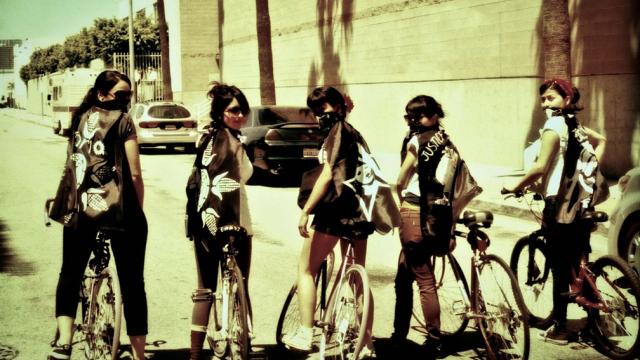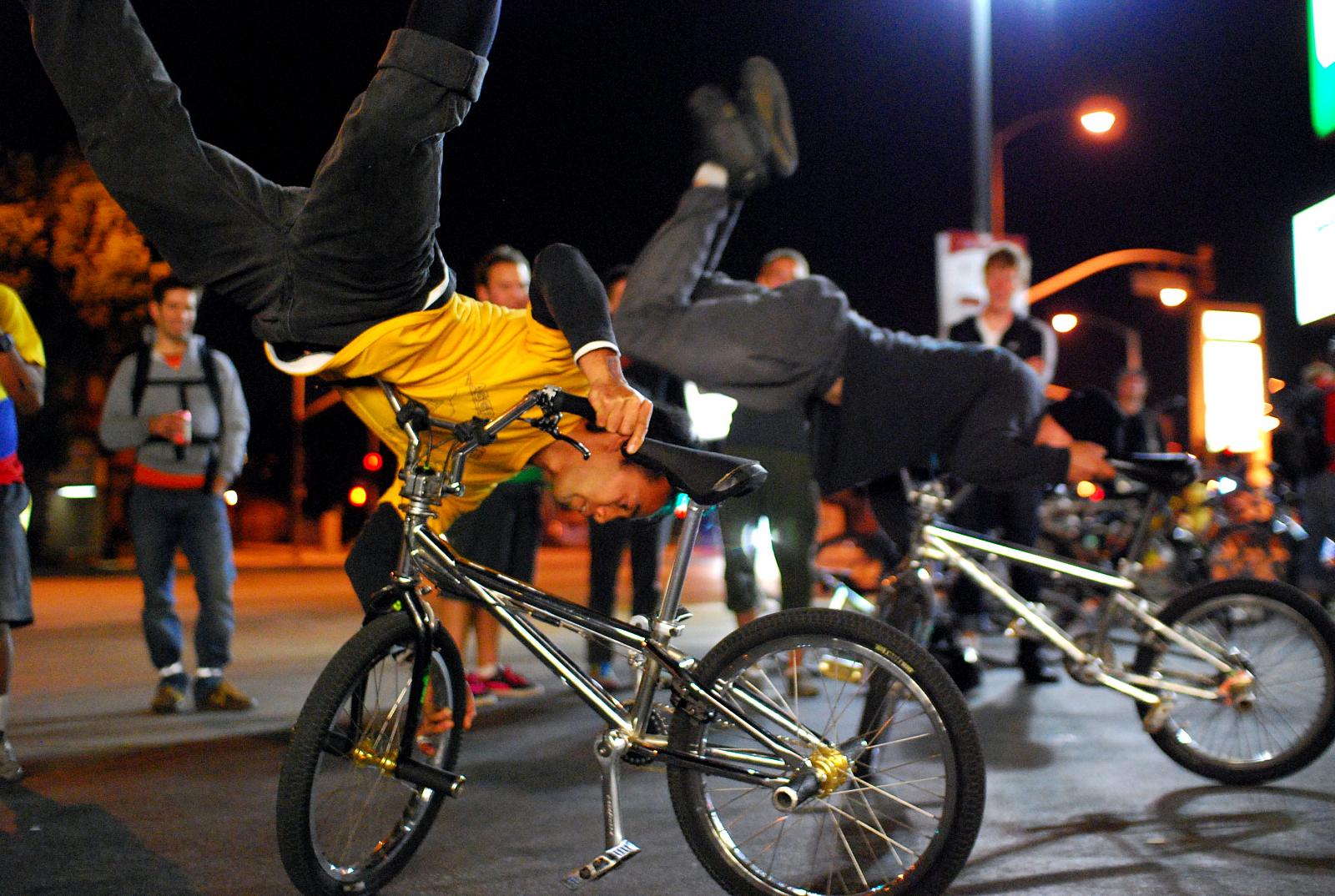
Riding bikes in Los Angeles is like riding with family: We celebrate and commune even when the only blood between us is road rash from near-death falls. Our family rides against traffic and the dominant culture. We have evolved from our origins as young punks and brought all ages of bicycle activists out of their homes and into the streets to form innovative and radical groups whose two-wheeled tools address specific and far-reaching community needs.
We reach far across the city like the roots of the ficus trees that disrupt L.A. sidewalks. Our parents, the Midnight Ridazz, modeled the counterculture for us. Three women began the Midnight Ridazz as a simple, small ride with a few friends. They organized around “fun and inclusive love, not divisive anger,” recalled Don “Roadblock” Ward, one of the first riders, speaking in a retrospective interview with KCET.
The rides grew from six participants to almost 2,000 and sparked a cycling movement across the city. The alternative culture of the Ridazz drew in diverse cyclists but it especially welcomed those outside the mainstream: the underdressed, the radicals, the jokers. These rides exemplify the simple joy of riding, while emphasizing the political act – in America at least – of using a bicycle as a primary mode of transportation.
Today, the Ridazz have grown like old oaks and now inspire other projects that uphold the rights of cyclists. Rides and riders have multiplied as the Internet facilitates posting and hosting rides. In 2013, invitations to over 500 unique rides showed up on theMidnight Ridazz website – events hosting anywhere from five to 500 riders, each action with its own subculture and highlighting a different area of the city. Rides grown “classic,” like L.A.’s Critical Mass on Wednesdays, and C.R.A.N.K. Mob, still frequent the scene alongside newer ones.
With all of these bicycles in the streets, accidents still abound in Southern California. But we continue to fight for our rights. TheEastside Riders and Los Ryderz on the south side of Los Angeles honor fallen friends monthly in the Bike Ride for Safety and Justice, named in honor of Benjamin Torres who was killed in a hit-and-run in Gardena.
Torres’s untimely death is a reminder of the dangers of riding in a city dominated by the car. By honoring fallen riders, advocates continue to bring awareness to both bikers and drivers – and, in many cases, to demand justice. The blog Biking in LA keeps a saddening record of the cycling death statistics, reporting 89 deaths in Southern California in 2013 – and an increase in L.A. County bicycling deaths by 54% this year alone.
Policy advocates in Los Angeles like the Los Angeles County Bicycle Coalition, alongside statewide bicycle advocacy groups, have worked to pass California’s 3-foot law that will go into effect in September 2014, requiring drivers to pass bicycles with a 3-foot buffer.
Bike advocates have also helped bring about the city’s Anti-Harassment ordinance, which the L.A. Times explains “makes it a crime for drivers to threaten cyclists verbally or physically,” as well as allows cyclists to take drivers to civil court – the first ordinance of its kind in the country. Though the risks remain, the Los Angeles cycling community continues to fight to expand its rights and develop new laws that protect it.
We also cook for each other and we eat together. Groups like Food Not Bombs/Comida No Bombas in Los Angeles uses bicycles to further the fair distribution of food and resources. These groups prepare hot food such as soups, beans, rice, burritos and other dishes to serve free to low-income people, which they deliver using bicycles with homemade trailers.
Two Los Angeles City Council members want to ban feeding the homeless in public and make the food service provided by these bicycle groups illegal. In response, bike members joined a large protest in December that generated attention on the corner of Hollywood and Vine, a location where many homeless people spend time.
Even Forbes magazine recently called the motion one of the five “most ridiculous government bans of 2013.” The cyclists of Los Angeles will continue to serve, even if unjust laws become prohibitive.
We also take care of each other. Using the bicycle as a healing tool, the Ovarian Psycos, an all womyn of color cycling collective, has developed a unique culture through all-womyn/queer/femme-identified rides every full moon. Through various events – like discussions led by a women’s center worker, or an ancestor ceremony to honor those before them – the Ovarian Psycos strive to heal their communities spiritually, emotionally and physically using bicycles as the outlet. They also help get female-identified people on bicycles in a city where ridership increased by 32% from 2009-2011 alone, according to the Los Angeles Bicycle Coalition) – but where female participation still accounts for less than 20%. The Ovarian Psycos have garnered widespread attention, encouraging the proliferation of their annual Clitoral Mass ride to six cities across the nation in its second year.
We are a united community. Some of the most supportive bicycle groups ride the streets of the south side of Los Angeles. Los Ryderz and the Eastside Riders Bicycle Club join to form the United Riders, providing youth access to health workshops, community issue-themed rides, rallies, clean-up days and community fairs. The National Institute on Out-of-School Time recommends that children and youth have “access to and sustained participation in quality programming with strong partnerships with schools, families and the community.” The United Riders are part of this equation, responding to social needs using bicycles as a tool.
In Los Angeles, we work together to carry out radical change in unique ways. We harness bicycles as a means of promoting our own autonomy, healing our communities, and bringing about a future free of oppression. The culture we counter is not just the culture of cars, but a debilitating economic system and isolating individualism. Through bicycles we create chosen families. In family, we begin to heal, and in healing, we find the strength to resist.
3 WAYS TO SHOW YOUR SUPPORT
- Log in to post comments














